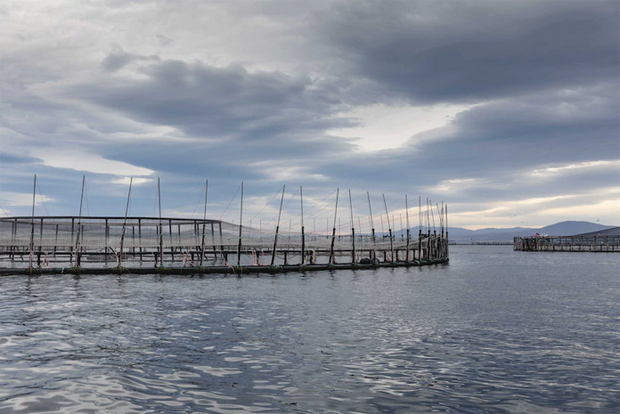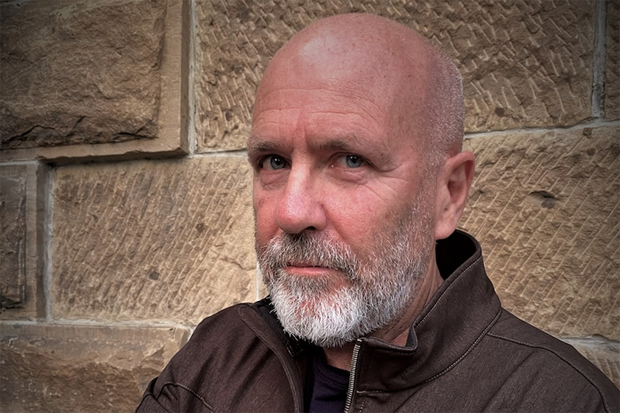
There are three major producers of farmed salmon in Tasmania. Pic: ABC News: Sophie Zoellner

Opponents to farmed salmon point to environmental issues.

A salmon farming enclosure off the Tasmanian coast.

Tasmanian author Richard Flanagan. Pic: ABC News: James Dunlevie
24 April 21
"Come down here and talk to the fisherman, to the shack owner, to the kayaker, to the surfer, and ask them what's going on."
Booker prize-winning author Richard Flanagan has taken a swipe at Tasmania's salmon industry, describing it as "one big lie".
Flanagan took aim at what he described the industry's "harsh" animal management practices and the government regulation — claiming the product being sold is not as healthy as advertised and warned of what a mass expansion of the industry would bring.
Speaking on the ABC's AM program, Flanagan said he'd been motivated to write his new book, Toxic: The Rotting Underbelly of the Tasmanian Salmon Industry, because of the "slow destruction" of the environment near his Bruny Island shack from where he had written all of his previous books.
"The spur was that the water started dying, the fish started vanishing, slime and algae started appearing," Flanagan said.
"I thought I would write something about this, just a short article, and then I started talking to scientists, to people in other communities and I discovered one story of horror after another, after another," he said.
"I realised that Tasmanian Atlantic salmon is just one big lie. It's not clean, it's not green and it's not even healthy."
Mr Flanagan, who stated that there was "another massive sea grab coming that the state government is keeping quiet" said his book was not timed to coincide with the state election campaign, which is occurring a year earlier than scheduled.
"It's got nothing to do with the Tasmanian election, but it does raise very serious issues.
"What's going on in Tasmania is that these beloved coastal waterways that are so important to everyday Tasmanians are being stolen from them and locked up to benefit a handful of very rich corporations," he said.
Flanagan said the planned expansion of the industry included areas like Boat Harbour and Stanley on the north west coast, Port Arthur in the south.
He dismissed the industry's claim of sustainable farming practices and said when consumers eat salmon they were also eating chicken "feathers, fat and the macerated beaks, claws [and] guts".
Flanagan said a salmon processor he had spoken to had stressed that the levels of ethoxyquin — a stabiliser used in salmon feed — in Tasmanian salmon were well within the European limits of 150 milligrams per kilogram of feed.
"But what if there are no safe levels and why is this being kept so secret?" he said.
Flanagan also said fish meal was being used less by the industry, and replaced by plant-based and animal product: "Processed industrial chicken."
Flanagan said he wanted to "see this industry survive" but added he believed it to be a "very small employer in Tasmania" with around "1,500 jobs".
"They [producers] should be going to land-based, that's what's happening around the world.
"The industry is very good at silencing its critics and the book details a long history of threats, intimidation and the use of legal ploys such as non-disclosure agreements to silence any criticism escaping," he said.
"But come down here and talk to the commercial fisherman, the recreational fisherman, to the shack owner, to the kayaker, to the surfer and ask them what's going on."
Flanagan claims there will be a massive expansion of salmon pens in the state that Tasmanian government had not told voters about.
"I know from sources within government that what's being proposed are beloved areas of the north west coast … from Burnie through to west of Wynyard. These are beautiful places like Boat Harbour, possibly Rocky Cape, possibly Table Cape."
"You'll hear all this nonsense about world's best practice … about how we live within regulations, there are a lot of regulations, none of which are enforced," he said.
Deputy Liberal Jeremy Rockliff leader did not rule out a wide expansion of fish farms in the state but said the community would be consulted before any plans progressed.
"There'll be no expansion of any salmon industry across Tasmanian waters without thorough analysis, thorough consultation," he said.
"If there are expansion opportunities into the future and it does employ many Tasmanians and it's done on a very sustainable basis that would be welcome, but that is a long way away.
"There is a lot of work to do when it comes to establishing opportunities for aquaculture, ensuring the sustainability of aquaculture."
Mr Rockliff said there had been "huge gains" in the transparency, sustainability and regulation of the salmon industry since the Liberals came to power in 2014.
Local industry a 'global leader', spokesperson says
A Tasmanian Salmonid Growers Association (TSGA) spokesperson said the organisation was "still reading the book with a science-based lens".
"Richard Flanagan is primarily celebrated for his works of fiction. The TSGA urges people to be informed by facts, widely available from governments and leading researchers, and from the reporting of the companies," the spokesperson said.
"Factual information about our industry is available from science-based organisations like CSIRO and Institute for Marine and Antarctic Studies and other universities around the world."
"Tasmanian salmon is a global leader, independently accredited by organisations like the Aquaculture Stewardship Council, Best Aquaculture Practices and the RSPCA."
"The TSGA welcomes robust discussion — our industry is always striving to do better for the environment and our communities, and feedback is an important part of that — but debate must take in all sides and consider science-based evidence."
- AUTHOR: ADAM LANGENBERG
- SOURCE: THE ABC
Please choose your region
Australia | US / Rest of the World(Changing your region, will clear your cart)